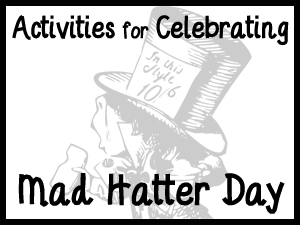
Mad Hatter Day is just around the corner.
At least it is for persons in the United States.
Which reminds me…here’s a bit of trivia for you.
Did you know that Mad Hatter Day is celebrated on two different days?
It’s observed on October 6th in the United States and on June 10th in the United Kingdom.
Can you figure out why that is?
I’ll give you a hint: Look at the Mad Hatter’s hat.
Think about it. I’ll give you the answer at the end of this post.
Meanwhile, let’s look at some fun activities that you and your kids can do to celebrate Mad Hatter Day.
Activities for Mad Hatter Day
Here are some ideas for celebrating this “mad” holiday.
- Read aloud “A Mad Tea Party” from Alice’s Adventures in Wonderland.
- Make paper hats.
- Have a Mad Hatter Tea Party.
- Read riddles to each other.
- Have your children write their own riddles (real or fake like the Hatter’s).
- Let your children write their own version of “Twinkle, Twinkle” with this songwriting activity.
- Dress up as characters from Alice’s Adventures in Wonderland.
- The Mad Hatter says that Time is a person. Have your children draw a picture of what they think Time looks like.
- Have your children copy some phrases from A Mad Tea Party Copywork.
- Try treacle (molasses is the American equivalent).
- Let your children illustrate the story the Dormouse tells.
- Have your children draw things that start with ‘M’ as the Dormouse said.
- Try to think of a possible answer to the Mad Hatter’s riddle.
- Discuss logical fallacies with your children and try to find them in “A Mad Tea Party”.
- Sing “Twinkle, Twinkle, Little Bat” together.
- Let your child color these free coloring pages of images from Alice’s Adventures in Wonderland.
Mad Hatter Day is a day to celebrate silliness, so anything goofy that you can think of to do with your children will also work well on this day.
Now, here’s the answer to my question about why Mad Hatter Day is celebrated on two different days.
The label on the Hatter’s hat in John Tenniel’s illustration is 10/6. We, in America, read dates as month/day so 10/6 is October 6th. In the United Kingdom, dates are read day/month so 10/6 is June 10th.
But wherever you are in the world and whatever day you celebrate it on, have a Happy Mad Hatter’s Day.








Susan, thanks for pushing the fun holiday. One question – does anyone in the UK actually observe June 10 as “Mad Hatter Day”? Yes, it would make sense, but so far as I can determine no one in Britain has picked up on this holiday invented in the U.S.(by some Boulder CO computer folk, back in 1986). Though several folks have noted the possible European variation based on the different ways of writing dates, I find no mention of anyone celebrating June 10. http://www.cs.cmu.edu/~ari/madHatter.html
Silly me – it looks like at least one British group picked up on this back in 2009, and explained that in the UK it should be June 10. Oddly, though, their observance was listed for June *20* ?? A little mad?
http://www.iberkshires.com/story/31242/Celebrate-Mad-Hatter-Day-at-Sheffield-Historical-Society.html
Incidentally, here’s evidence from the episode itself, that the 6th is to be preferred:
>>The Hatter was the first to break the silence. “What day of the month is it?” he said, turning to Alice: he had taken his watch out of his pocket, and was looking at it uneasily, shaking it every now and then, and holding it to his ear.
Alice considered a little, and then said “The fourth.”
“Two days wrong!” sighed the Hatter. “I told you butter would not suit the works!” he added, looking angrily at the March Hare.<<
OBSERVATION: if the Hatter's watch is two days off, it must read either the second or the *sixth*!
Wow Bruce! You found a lot of great info. I used some of the same resources when looking up Mad Hatter Day. I imagine that Mad Hatter Day probably has a small following in the UK. It’s not exactly a huge celebration in this country. I like to find these lesser known holidays to share with others. Throwing in a fun activity or two tied to a holiday can help break the monotony of the school year. Thanks so much for sharing what you discovered.
I like to find these lesser known holidays to share with others. Throwing in a fun activity or two tied to a holiday can help break the monotony of the school year. Thanks so much for sharing what you discovered.